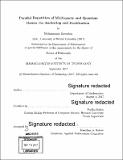| dc.contributor.advisor | Madhu Sudan. | en_US |
| dc.contributor.author | Bavarian, Mohammad | en_US |
| dc.contributor.other | Massachusetts Institute of Technology. Department of Mathematics. | en_US |
| dc.date.accessioned | 2018-02-08T16:28:45Z | |
| dc.date.available | 2018-02-08T16:28:45Z | |
| dc.date.copyright | 2017 | en_US |
| dc.date.issued | 2017 | en_US |
| dc.identifier.uri | http://hdl.handle.net/1721.1/113550 | |
| dc.description | Thesis: Ph. D., Massachusetts Institute of Technology, Department of Mathematics, 2017. | en_US |
| dc.description | Cataloged from PDF version of thesis. | en_US |
| dc.description | Includes bibliographical references (pages 107-111). | en_US |
| dc.description.abstract | Parallel repetition is a fundamental operation for amplifying the hardness inherent in multiplayer games. Through the efforts of many researchers in the past two decades (e.g. Feige, Kilian, Raz, Holentstein, Rao, Braverman, etc.), parallel repetition of two-player classical games has become relatively well-understood. On the other hand, games with entangled players (quantum games), crucial to the study of quantum non-locality and quantum cryptography, and multi-player games were poorly understood until recently. In this thesis, we resolve some of the major problems regarding the parallel repetition of quantum and multi-player games by establishing the first exponential-rate hardness amplification results for these games and hence extend the classes of games where exponential decay rates is known considerably. We consider two different methods for obtaining these hardness amplification results. For our first method, we draw from the recent work of Moshkovitz on parallel repetition of fortified games. We introduce an analytic reformulation of Moshkovitz's fortification framework. This reformulation allows us to expand the scope of the fortification method to new settings. In particular, we prove parallel repetition and fortification theorems for games with players sharing quantum entanglement, and games with more than two players in this new framework. An important component of our work is a variant of the fortification transformation, called ordered fortification, that preserves the entangled value of a game. For our second method, we introduce a class of games we call anchored. Anchoring is a simple transformation on games inspired in part by the transformation proposed in the pioneering work of Feige-Kilian. Unlike the Feige-Kilian transformation, our anchoring transformation is completeness preserving. We prove an exponential-decay parallel repetition theorem for anchored games that involve any number of entangled players. We also prove a threshold version of our parallel repetition theorem for anchored games. | en_US |
| dc.description.statementofresponsibility | by Mohammad Bavarian. | en_US |
| dc.format.extent | 111 pages | en_US |
| dc.language.iso | eng | en_US |
| dc.publisher | Massachusetts Institute of Technology | en_US |
| dc.rights | MIT theses are protected by copyright. They may be viewed, downloaded, or printed from this source but further reproduction or distribution in any format is prohibited without written permission. | en_US |
| dc.rights.uri | http://dspace.mit.edu/handle/1721.1/7582 | en_US |
| dc.subject | Mathematics. | en_US |
| dc.title | Parallel repetition of multi-party and quantum games via anchoring and fortification | en_US |
| dc.type | Thesis | en_US |
| dc.description.degree | Ph. D. | en_US |
| dc.contributor.department | Massachusetts Institute of Technology. Department of Mathematics | |
| dc.identifier.oclc | 1020252482 | en_US |
